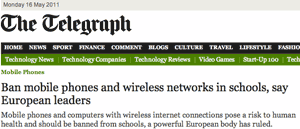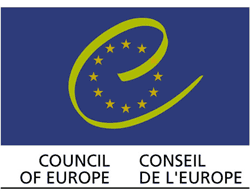Fear of a wireless planet
 Monday, May 16, 2011 at 6:34PM
Monday, May 16, 2011 at 6:34PM  Read all about it...In an age where there is so much information the headline is king.
Read all about it...In an age where there is so much information the headline is king.
So it is with those reader hungry newspapers who live off scare stories where they don’t have practice much, you know, “journalism”.
Journalism is defined in Wikipedia as “the practice of investigation and reporting of events, issues and trends to a broad audience”.
The Oxford English Dictionary is more succinct and describes it thus “the activity or profession of writing for newspapers or magazines or of broadcasting news on radio or television”
Whilst I prefer the more lofty definition presented by Wikipedia I’m more inclined to believe the investigation-free version offered by OED that's more in keeping with the journalistic practice demonstrated by todays mainstream press.
Take this headline from The Telegraph newspaper:
“Ban mobile phones and wireless networks in schools, say European leaders”
Or this headline from the Daily Express:
“CALL FOR SCHOOLS TO BAN MOBILES IN NEW CANCER ALERT”
Or this one from the Daily Mail:
“Ban mobile phones and wi-fi from schools ‘as they are potentially harmful’”
Heady stuff (no pun intended), more than enough to fuel numerous blogs (including this one) and copycat news items around the world much like the story of Chicken Little who after an incident with an acorn decided that the “sky was falling in” and sets off to tell the king collecting, other animals along the way.
Optional cartoon interlude:
Given the shortage of journalists working at these papers perhaps a little critical thinking from an enquiring mind might be in order.
So what’s the background to the story?
Well, a committee from the Council of Europe published a report / working document on May 6th entitled “The potential dangers of electromagnetic fields and their effect on the environment”. The committee proposes a draft resolution that
“all reasonable measures to reduce exposure to electromagnetic fields, especially to radio frequencies from mobile phones, and particularly the exposure to children and young people”.
It then proposes banning
“all mobile phones, DECT phones or WiFi or WLAN systems from classrooms and schools” and also anticipates legislation to “to keep high-voltage power lines and other electric installations at a safe distance from dwellings”.
It justifies this proposed action because “waiting for high levels of scientific and clinical proof can lead to very high health and economic costs”. So what’s the Council of Europe (CoE) and who belongs to the committee?
So what’s the Council of Europe (CoE) and who belongs to the committee?
First off, the CoE is not the European Union neither is it the European Parliament nor the European Council.
The CoE has been around for over 60 years with 47 member countries and whose objective is
“to create a common democratic and legal area throughout the whole of the continent, ensuring respect for its fundamental values: human rights, democracy and the rule of law.”
 Mr Jean Huss MP, Green Party, LuxembourgThe CoE’s Committee on the Environment, Agriculture and Local and Regional Affairs responsible for the report is composed of politicians rather than scientists. The report has been prepared by Mr Jean Huss, a Green Party MP in the Luxembourg legislative Chamber.
Mr Jean Huss MP, Green Party, LuxembourgThe CoE’s Committee on the Environment, Agriculture and Local and Regional Affairs responsible for the report is composed of politicians rather than scientists. The report has been prepared by Mr Jean Huss, a Green Party MP in the Luxembourg legislative Chamber.
The report has yet to be debated by Council of Europe which is scheduled for debate in Kiev on May 27th where it will be approved or otherwise. So currently this report does not represent the views of the Council of Europe. Besides even if it did the views expressed are somewhat different from the European Commission.
The reason why our auspicious newspapers would pick up on this non-story and run such misleading headlines is clear, they sell newspapers.
The reason why these politicians would ignore the peer-reviewed research from the World Health Organisation, Health Protection Agency and numerous other organisations including the European Commission in favour of claims made by the anti-RF lobby is less clear. Hello, may I speak with Mr Huss...It’ll be interesting to learn how the Council of Europe responds to this report.
Hello, may I speak with Mr Huss...It’ll be interesting to learn how the Council of Europe responds to this report.
Certainly if it makes recommendations about mobiles, Wi-Fi, WLAN, health and kids that differ from the advice already provided by the agencies responsible there’s a story worth reporting which may or may not have anything to do with health but until then let’s look at the facts rather than the catchy headlines.
If you've found this post interesting and would like to leave a comment please do!


Reader Comments (7)
I'm not overly suprised about the Daily Mail or the Express but I did have a lingering hope that the Telegraph might check what they are printing.
It really begins to feel as though the lunatics have taken over the asylum. Anything for a headline and to hell with the facts.
Pauline, the Telegraph is the worst of the lot. Shoddy,sensationalist 'journalism' dressed up in a broadsheet. It may as well be the Mail.
There is a deeper concern here. These publications unfortunately represent the thoughts of an awful lot of people, and them being allowed to print these sort of scaremongering articles could potentially set back the progress of the use of relevant, exciting and game-changing technology in schools.
How do we go about getting this article (and others like it) in front of the right people?
Best get re-tweeting!
Seeing that a politician from the Green party can get his non-scientific views aired to a mass audience, I'm trying to balance the argument with my own non-peer-reviewed, completely-biased reports. Here's my first one which proves that bees aren't affected by electromagnetic radiation.
I'm joking of course. You can't prove anything by just writing it on the internet, or even in a supposed 'broadsheet' like the Telegraph. Thanks for the links to the proper research, Graham - it's useful to remind folks who are liable to panic when they read such stuff in the papers that the principle of abrogation does not always apply.
It has happened before, and it will happen again. There are clearly public concerns over any new technologies, but this one may actually backfire. WiFi is so prevalent today, in devices, TVs, that people accept it's use - but they don't understand it. Mind you, they don't understand TV or radios, but they accept them. What is needed is some campaign to ensure a simple level of knowledge is available for thosevwho want it. Use understandable similes, exemplars that bring the scale of the issue into perspective. "as dangerous as a wireless set. I'd love to see what people said when electricity first arrived in schools.
The press COULD help.........?
Thanks for all the feedback!
This blog post along with others plus some community tweeting did elicit a response from the Council of Europe which whilst not distancing itself from the highly misleading and inaccurate headlines presented by some sections of the mainstream press did concur with my setting out of the facts here.
The headlines I refer to above are some of the worst examples. The Telegraphs assertion that "European Leaders" had called for a ban and that a "powerful European body has ruled" is clearly incorrect given that no European leaders have yet been involved save an MP from Luxembourg and no European body has ruled on anything in this regard. Additionally even if the CoE did approve the draft report or accept a resolution to ban mobile phones and wireless networks in schools it only has the power to influence the EU rather than enforce.
It will, of course, be interesting to learn how this draft will be debated when it reaches Council on the 27th and what research and evidence will be submitted and whether this will be a debate amongst uninformed or biased politicians or if acknowledged specialists and scientists will be involved in what is an important discussion that could have huge implications down the line for the educational opportunities of children in the Western world as well as those in developing countries where wired access is simply not an option.
My personal feelings on this subject is similar to my feelings on the debate about the causes of Bee Colony Collapse Disorder.
Rather than make up sensationalist headlines with unsubstantiated claims that mobile and wireless technology are responsible there should be research that attempts to understand what is causing Colony Collapse Disorder (latest research suggests that it is a virus.
For those who have suffered symptoms currently described as "Electrosensitivity", sleeping disorders, unexplained headaches and other maladies associated with the 21st century the possible causes should be researched without jumping to premature and unlikely conclusions for column inches.
The chemical environment in which we are immersed, the burning of fossil fuels, the use of plastics, media bombardment, our life and working styles and the combination thereof are no doubt also having their presence felt on the human condition.
The results of objective research should then inform future developments and improvements to the things we need to operate within the present and to face the challenges of the future.
Mobile telephony and wireless connectivity is not going to suddenly be switched off just as the Internet isn't going to suddenly stop because too many people have access to too much information which is leading to revolutions. In the event that a genuinely damaging link between EMF and health is eventually discovered then this information should inform the designers of mobile & wireless technologies so they can be improved. An immediate ban unsupported by reliable evidence is not the right answer in my opinion.
Of course, the single largest killer of children in the Western world is accidents caused by cars on roads, yet invariably schools and homes are found right next to them.
EMF has already been brought before the EU Parliament. The content of this Council of Europe report is consistent with the two European Parliament resolutions adopted in 2008 and 2009, at near-unanimous (96% & 97%) votes:
“wireless technology (mobile phones, Wi-Fi / WiMAX, Bluetooth, DECT landline telephones) emits EMFs that may have adverse effects on human health... particularly to young people whose brains are still developing”.
"...the limits on exposure to electromagnetic fields which have been set for the general public [by ICNIRP and the WHO] are obsolete. They do not take account of developments in information and communication technologies or vulnerable groups, such as pregnant women, newborn babies and children."
the EU Parliament "calls on the Member States to follow the example of Sweden and to recognize persons that suffer from electrohypersensitivity as being disabled so as to grant them adequate protection as well as equal opportunities."
http://www.europarl.europa.eu/oeil/FindByProcnum.do?lang=en&procnum=INI/2008/2211
http://www.europarl.europa.eu/oeil/FindByProcnum.do?lang=en&procnum=INI/2007/2252
@Parent
Thank you for joining this discussion and adding your contribution.
In fairness to other posters who have given their name I think at the very least you should declare your interest which in addition to possibly being a parent you are also representing the blog SafeInSchool.
The European Parliament procedure documents that you cite here are interesting but weren't upheld as you can see from these later documents:
http://ec.europa.eu/health/electromagnetic_fields/eu_actions/index_en.htm (see Call for Review section)
and here:
http://ec.europa.eu/health/electromagnetic_fields/research/index_en.htm (see Monitoring)
and finally here:
http://ec.europa.eu/health/ph_risk/committees/04_scenihr/docs/scenihr_o_022.pdf
The EU Recommendation of 1999 on EMF has not been changed.
As I mentioned above there may very well be a cause of electrohypersensitivity however numerous studies have shown that people who claim to be electrosensitive are incapable of determining whether there is an active wireless signal in their vicinity.
The thrust of my original blog post concerns the sensationalist and irresponsible "journalism" that we are seeing around this issue.
Take today's headline in the Daily Mail:
Mobile phones CAN increase risk of cancer: Doctors reveal shock results of major study into effect on the brain
This headline and the story that follows is simply incorrect as Cancer Research UK and the Health Protection Agency have pointed out.
The story that the Daily Mail seeks to scare their readership with, replete with pictures of mobile phone waving children, amounts to nothing more than a group within the World Health Organisation who have reclassified mobile phone usage as "possibly carcinogenic" in the same way that coffee may be although not as definite as sunlight!
This is hardly helpful reporting serving neither those who have genuine concerns over EMF based technologies nor those who are putting mobile and Wi-Fi technologies to good use in the educating of children within our homes and schools.
Whilst the anti-Wi-Fi lobby proceeds to take up column inches with what appears to be a "Chicken Little" approach to evidence (I really do recommend watching the cartoon in my blog) demanding that Western schools use only wired connections to the Internet I do wonder what suggestions are put forward for the majority of people on the planet for whom wired connections are simply not an option?
How would this work throughout Africa for example where wired telephony and Internet access is almost universally unavailable?